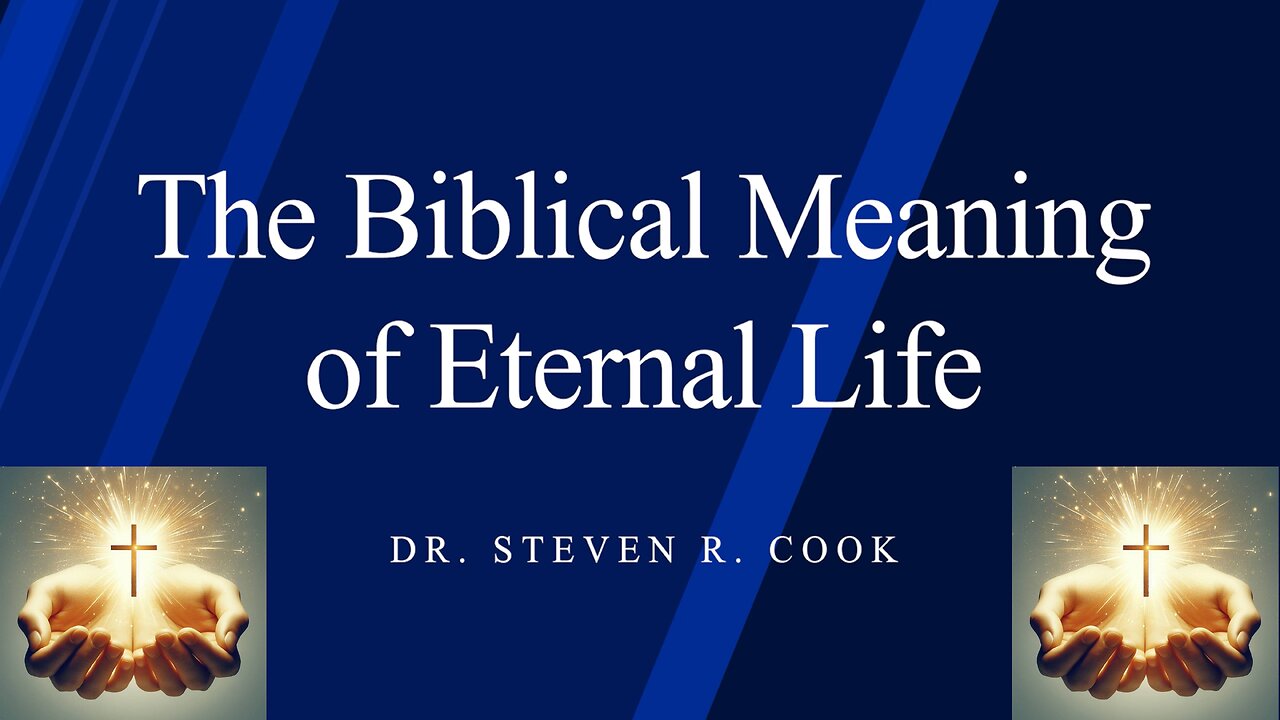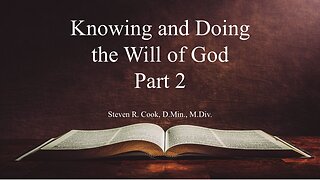Premium Only Content

The Biblical Meaning of Eternal Life
John wrote, “whoever believes will in Him have eternal life” (John 3:15), and “God so loved the world, that He gave His only begotten Son, that whoever believes in Him shall not perish, but have eternal life” (John 3:16). And Jesus pointed others to Himself, saying, “For this is the will of My Father, that everyone who beholds the Son and believes in Him will have eternal life, and I Myself will raise him up on the last day” (John 6:40), and “Truly, truly, I say to you, he who believes has eternal life” (John 6:47; cf., John 10:28). Jesus, when saying the believer “has” eternal life in John 6:47, used the Greek verb echō (ἔχω – to have or possess), which is in the present tense, meaning it’s a right-now-truth. That is, eternal life is what the believer possesses at the moment of faith in Christ. This eternal life is connected with being in a relationship with Jesus Christ. John wrote, “God has given us eternal life, and this life is in His Son. He who has the Son has the life; he who does not have the Son of God does not have the life” (1 John 5:11-12).
We should also understand that eternal life does not merely refer to our unending existence in which we spend eternity with God in heaven, but that there’s a qualitative dimension to it. Jesus said, “I came that they may have life, and have it abundantly” (John 10:10), and “This is eternal life, that they may know You, the only true God, and Jesus Christ whom You have sent” (John 17:3). Merrill C. Tenney states, “Eternal, the new life God gives, refers not solely to the duration of existence but also to the quality of life as contrasted with futility. It is a deepening and growing experience. It can never be exhausted in any measurable span of time, but it introduces a totally new quality of life.” (Merrill C. Tenney, “John,” in The Expositor’s Bible Commentary: John and Acts, vol. 9, 50)
In its entirety, eternal life is a free gift offered by God to those who trust in Christ as Savior (John 3:16; Eph 2:8-9), an experience to be enjoyed now (John 10:10), and a future reward for a life of sacrifice (Luke 18:29-30). As we advance spiritually in our walk with the Lord by learning His Word (2 Tim 2:15; 3:16-17; 1 Pet 2:2; 2 Pet 3:18), being filled with the Spirit (Eph 5:18), walking obediently by faith (2 Cor 5:7; Heb 10:38; 11:6), praying often (Eph 6:18; 1 Th 5:17), developing an attitude of gratitude (Eph 5:20; 1 Th 5:18), fellowshipping with other believers (Acts 2:42; Heb 10:25), engaging in worship (Eph 5:19; Heb 13:15), and allowing trials to shape us spiritually (Jam 1:2-4), we will experience what Paul told Timothy, when he instructed him to “take hold of the eternal life to which you were called” (1 Tim 6:12). This is the quality of life of believers who, in time, operate with positive volition toward God as their divine Parent and obey His directives to advance to spiritual maturity.
Warren Wiersbe notes, “We have ‘eternal life’ and need to take hold of it and let it work in our experience.” (Warren W. Wiersbe, The Bible Exposition Commentary, vol. 2, 236)
William MacDonald adds, “He is to lay hold on eternal life. This does not mean that he is to strive for salvation. That is already his possession. But here the thought is to live out in daily practice the eternal life which was already his.” (William MacDonald, Believer’s Bible Commentary, 2101)
Joseph Dillow states:
“Possessing eternal life is one thing in the sense of initial entrance, but “taking hold” of it is another. The former is static; the latter is dynamic. The former depends on God; the latter depends on us. The former comes through faith alone; “taking hold” requires faith plus “keeping commandments” (1 Timothy 6:14). Those who are rich in this world and who give generously “will lay up treasure for themselves as a firm foundation for the coming age, so that they may take hold of the life that is truly life” (1 Timothy 6:19). Eternal life is not only the gift of regeneration; it is also “true life” that is cultivated by faith and acts of obedience.” (Joseph C. Dillow, Final Destiny: The Future Reign of the Servant Kings, 4th Edition, Houston, TX: Grace Theology Press, 2018)
-
 1:01:10
1:01:10
Thinking on Scripture
20 days agoKnowing and Doing the Will of God Part 2
131 -
 1:09:19
1:09:19
Ami's House
1 day ago $10.04 earnedWhen Defending Israel Backfires: Are We Pushing Our Last Friends Away? With Karys Rhea
145K135 -
 8:13
8:13
WhaddoYouMeme
18 hours agoThis Gets More Tragic By The Second
6264 -
 40:47
40:47
SouthernbelleReacts
2 days agoThe Faculty (1998) | Back-to-School Horror Movie Reaction | Alien Invasion in High School!
6114 -
 6:58
6:58
Adam Does Movies
17 hours ago $0.09 earnedCaught Stealing - Movie Review
598 -
 23:41
23:41
JohnXSantos
14 hours agoI Built a $1M Clothing Line for My Toddler in Just 14 Days
4751 -
 30:00
30:00
Nicholas Bowling
14 hours ago30 Minutes of EXPOSING Religious Hypocrites! (They Literally Run Away)
380 -
 LIVE
LIVE
Joe Donuts Live
4 hours ago🟢 BF2042 Explosive Action: Training for Battlefield 6!
143 watching -
 47:29
47:29
Man in America
21 hours agoIT DOESN'T ADD UP: The Trans Shooter's Story Is FULL of Holes
77.6K105 -
 LIVE
LIVE
FyrBorne
11 hours ago🔴Warzone M&K Sniping: Through the Fyr And Flames (Of SBMM)
115 watching